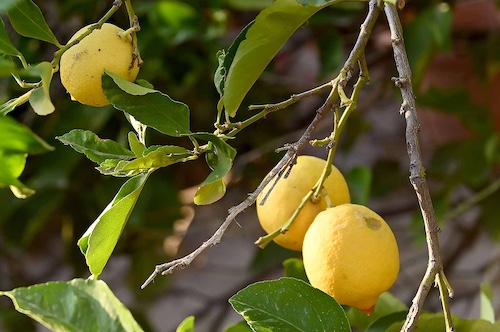The Greek mythological world abounds with gods and heroes. Their wondrous stories could fill dozens of bibles. A myth is a fabrication, even though in the Greek world the gods sometimes shook hands with historical heroes. For example, the battle for Troy really did take place, and amidst the clashing of weapons, real heroes shed blood.
Another mythological place is the Garden of the Hesperides where golden apples grew. Similar to the Garden of Eden, where apples also hung from the trees. Whilst in the Garden of Eden it was clearly juicy apples that grew; Greek myths do not always agree on which fruit the famous golden apples were. Guarded by lovely nymphs called the Hesperides, they may have been oranges, quinces, or real apples. Recently, I read a version that refers to citrus fruits, which the goddess Hera received as a wedding gift when she gave her consent to the supreme god Zeus. She had the garden especially created to hide the citrus fruit and appointed the three Hesperides to guard them: Aigle guarded the citrons, Arethusa the lemons, and Hesperathusa the oranges.
I don’t know when Hera married Zeus; there here are sources that whisper that the wedding night alone lasted 300 years. Somewhere in a very distant world, perhaps even when the trees on Lesvos had not yet petrified, Hera hid her lemons in a paradisiacal garden. A golden apple from the Garden of the Hesperides caused the Trojan War. And it was Heracles who ultimately managed to steal all the golden apples by killing a dragon.
It remains to be seen whether the golden apples may actually have been lemons; scientists claim that the ‘mother of mothers’ of the lemon was born somewhere in the hills of the Himalayas in India. Perhaps the Hesperides also lived in those regions? That precursor of the lemon, a fruit less bitter than today, developed into the delightful citrus family, including oranges, lemons, bergamots and citrons.
It was only around the 5th century BC that the yellow fruit roll into Greece via the Persians. It is said that they were used to make invisible ink for secret messages during the Greco-Persian War. It is also possible that soldiers from Alexander the Great’s army, who conquered the Persian Empire, returned with these bright yellow fruits as souvenirs from the Empire of the Medes and Persians. Later, Theophrastus, a botanist from Eresos (371–287 BC), was the first Greek to describe the lemon and called it the Persian or Median apple. At that time, people were not yet eating lemons, but the fresh scent of the fruits and leaves was used to keep clothing moth-free, and the juice and pulp formed a medicine like against poisoning. The Romans also valued lemons for their aroma and medicinal properties.
In the 11th century, the Egyptians drank lemon juice as a refreshing lemonade. In the 17th century, this drink was so popular in Europe that in Paris, hordes of street vendors sold the refreshing juice. The resulting peels were discarded everywhere and became part of the Parisian garbage —in turn being devoured by the rats, who consequently ingested limonene, a component that kills fleas. It is whispered that all those flea-toxic lemon peels ensured that the plague epidemic of 1668 passed by the French capital, as the plague was spread, among other things, by fleas.
The ancient Greeks knew nothing about limonene or about the positive effects of fresh fruit on scurvy. They only began to truly appreciate this fruit when it became clear that the sour lemon flavor could form a perfect marriage with olive oil, and let’s say that from the 11th century onwards, more and more lemons appeared in the Hellenic world. Nowadays the Greeks are addicted to lemons: the majority of Greek dishes cannot do without them.
Citrus fruits are ripe in the winter, but there are lemon trees that bear fruit all year round. A gift from the gods; it is as if you have a piece of the Garden of the Hesperides at home, because lemons give a wonderfully refreshing kiss to many a cooling drink in the summer.
Recently, I came across a drink I wasn’t familiar with: pickled lemonade. A lemonade made from lemon juice, sugar syrup, and the brine from dill pickles. Who dares to try a pickled summer? Good to chase away the heat for a while.
Pickled lemonade (for 1 lemonade glass)
1 shot glass of sugar syrup
1 shot glass of lemon juice
1 shot glass of dill pickle juice.
4 shot glasses (or more) of water.
top up with ice
For people who are less adventurous: lemon ice.
Lemon water ice
300 ml lemon juice
300 grams of sugar
450 ml water
a splash of vodka.
Remove the peel of the lemons and place them in a small saucepan. Pour the water over it and leave it for a night. Press the lemons for its juice and put in the fridge. The next day strain the peels out of the water, add the sugar to the water, and boil until the sugar has dissolved. Let it cool down. Then mix the sugar water and lemon juice in a bowl and add a generous splash of vodka to prevent the ice from becoming too hard. Put it in the freezer and stir regularly as the ice thickens to loosen the ice crystals a bit.
Once you have the ice, you can also top off a glass with ice with water as a refreshing lemonade, or a cool lemon ice wodka, when you add also some wodka.











